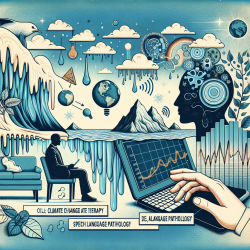Introduction
As practitioners dedicated to improving the lives of children, it's crucial to stay informed about the various factors that can impact their development. One such factor, often overlooked in the realm of speech-language pathology, is climate change. The research article "The existential risk space of climate change" sheds light on how existential risks associated with climate change can affect communities and individuals, potentially influencing the environments in which children grow and learn.
Understanding Existential Risks
Existential risks are defined as threats that could potentially annihilate humanity or drastically curtail its potential. The research by Huggel et al. (2022) identifies two levels of severity for these risks: threats to survival and threats to basic human needs. Although these might seem distant from the day-to-day concerns of a speech-language pathologist, understanding these risks can enhance our ability to provide comprehensive care.
Applying Research to Practice
So, how can this research be applied to improve your practice? Here are a few ways:
- Awareness and Advocacy: By understanding the potential impacts of climate change, practitioners can become advocates for healthier environments that support children's development.
- Interdisciplinary Collaboration: Collaborate with educators and policymakers to create environments resilient to climate change, ensuring that schools remain safe and conducive to learning.
- Research and Development: Encourage further research into how environmental factors, including climate change, affect communication disorders. This can lead to the development of innovative therapeutic approaches.
Encouraging Further Research
While the current research provides a framework for understanding existential risks, there is a need for more targeted studies that explore the direct impact of climate change on children's communication and cognitive development. As practitioners, supporting and participating in such research can lead to groundbreaking insights that enhance therapeutic outcomes.
Conclusion
Integrating the insights from climate change research into speech-language pathology can lead to more informed and holistic therapeutic practices. By considering the broader environmental context, practitioners can better support children's communication development in an ever-changing world.
To read the original research paper, please follow this link: The existential risk space of climate change.










